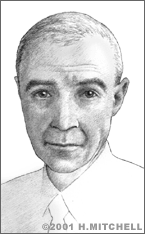J. Oppenheimer
Julius Robert Oppenheimer is likely the first name that comes to mind when one mentions the atomic bomb. He is credited with the creation of the devastating device in the early 1940s, a version of which was used in two instances during World War II in the summer of 1945.
Oppenheimer was born in New York City on April 22, 1904. He grew up in New York and attended the Ethical Culture School. Gifted from early on, he was especially interested in languages and would learn one quickly just so he could read a text in its original form. By the age of ten, Oppenheimer was delving into physics and chemistry. In 1921, he graduated high school as valedictorian of his class and was due to enroll at Harvard University that fall, but fell ill and postponed his studies while recovering in New Mexico. He later enrolled at Harvard in September of 1922.
While at Harvard, Oppenheimer majored in chemistry and graduated in three years. Realizing his passion was in physics, he traveled to England in 1925 and began studying physics at Cambridge University under Nobel Prize winner, J.J. Thomson. Oppenheimer later pursued a PhD at the University of Göttingen in Germany for quantum physics. After receiving his doctorate in 1927, he returned to the U.S. and began teaching at the University of California at Berkeley and at the California Institute of Technology in 1929.
Oppenheimer became deeply concerned with the rise of fascism in the 1930s and when the U.S. learned that the Germans had split the atom, Americans became worried that the Nazis could create devastatingly powerful weapons. In response, President Roosevelt established the Manhattan Project on October 9, 1941. Oppenheimer was appointed its director the following June.
Oppenheimer set up a new research station to develop weapons at Los Alamos, New Mexico, while additional research was conducted at Columbia University, the University of Chicago, and Oak Ridge, Tennessee. He invited the most established physicists to Los Alamos to work on creating the atomic bomb. Eventually, he was managing a team of more than three thousand people.
On July 16, 1945, the first atomic bomb explosion took place in the New Mexico desert. The success of the test led to the devastating destruction of the Japanese cities of Hiroshima and Nagasaki the following month. This infamous use of the atomic bomb still stands as an ethical debate today.
Following the war, Oppenheimer served as Chairman of the General Advisory Committee of the Atomic Energy Commission from 1947 to 1952, but his opposition to the development of the more destructive hydrogen bomb led to accusations of treason the following year. Though he was cleared of the charges, he lost security access and lost his position with the Atomic Energy Commision.
Oppenheimer held the academic post of director of the Institute of Advanced Study at Princeton University from 1947 to his retirement in 1966. In 1963, President Lyndon B. Johnson presented the physicist with the Enrico Fermi Award of the Atomic Energy Commission. He died of throat cancer on February 18, 1967.


